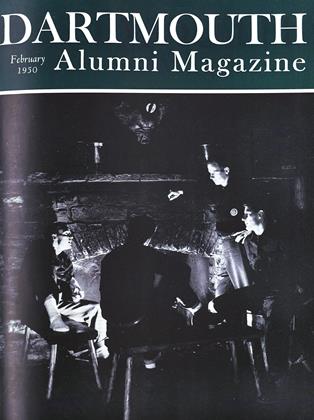Probably to a greater extent than ever before in its history, the independent college today must concern itself with the problems of making financial ends meet and of raising additional funds for scholarships, salaries, and plant needs. It is almost impossible to find an established institution that is not now engaged in a fund campaign of major proportions. Dartmouth, in these respects, is no exception.
If a comprehensive understanding of Dartmouth's financial outlook had been lacking among the alumni, certainly that void was filled by the forthright report from President Dickey to all Dartmouth men, distributed last month as a printed booklet. The President's report, complete and incisive, spells out the most urgent needs of the College, the priority assigned by the Trustees to endowment and current gifts for scholarships, and the steps being taken "to assure that the resources of the College in the future will be adequate to its purposes and opportunities." It also announces the establishment of the Dartmouth Development Council and explains the Council's responsibility for directing and coordinating all fund-raising activities.
When the subject of fund-raising comes up, Dartmouth men, through long custom, are inclined to think pretty much in terms of the Alumni Fund. As reported in this issue, the Class Memorial Funds, now totaling more than 1500,000, are steadily growing into one of the major financial assets of the College; and another development of great promise is the creation of regional scholarship funds by the alumni clubs. These are two fund activities of which the alumni are bound to become more and more aware, but it is still true that the great majority of Dartmouth men think primarily, if not entirely, in terms ef the Alumni Fund when the financial problems of the College are discussed.
Alumni Fund achievement over the years gives Dartmouth men the right to all the pride they feel regarding it. President Dickey, in his report, says: "The Alumni Fund is that strategic resource which meets the prime needs of Dartmouth when they must be met now, rather than tomorrow. ... It will, in truth, always be the growing point of Dartmouth's quality." The alumni funds of several other institutions have in recent years surpassed Dartmouth's both in money contributed (Princeton's $599,000 last year set a record for such annual giving) and in number of contributors, but in respect to the percentage of alumni contributing and results over a long period of years the Dartmouth Alumni Fund still retains its leadership.
There is one big disadvantage, however, in the satisfaction that Dartmouth men derive from their Alumni Fund record. That satisfaction tends to carry over into their thinking about the College's more general fund-raising efforts and to some extent obscures the fact that in the acquisition of urgently needed endowment and substantial funds for educational development, Dartmouth is falling far short of the impressive results being achieved by other leading colleges in the independent group.
Public announcements in recent months disclose that Brown has realized $4,300,000 of a $7,000,000 development fund, that Cornell in 14 months has received $9,200,000 toward its Greater Cornell Fund of $12,000,000, that M.I.T. has passed the $6,000,000 mark in its campaign for $20,000,000, that Harvard's goal of $20,000,000 for its undergraduate college is approximately half achieved, that Pennsylvania has raised $5,500,000, Bowdoin over $2,000,000, Wellesley $3,500,000, and Smith over $5,000,000 of a 75th Anniversary Fund of $7,000,000. Annual reports show that Princeton and Columbia each received more than $4,000,000 in gifts during 1948-49.
Dartmouth, if it is going to have the resources "adequate to its purposes and opportunities," must also be enabled to announce results as impressive as these. In taking over its new responsibilities and charting its plans, the Dartmouth Development Council is keenly aware of that, just as it is aware that there must be continued growth in those areas of fund raising where Dartmouth men do have cause for satisfaction. It is a necessary footnote to President Dickey's excellent report, it seems to us, to point up the accomplishments of other independent colleges and to express the conviction that what they are doing Dartmouth not only must but will do.
 View Full Issue
View Full Issue
More From This Issue
-
 Class Notes
Class Notes1918
February 1950 By ERNEST H. EARLEY, DONALD L. BARR, RICHARD A. HOLTON -
 Article
ArticleBack to Hanover in December
February 1950 By WILLIAM H. HAM '97 -
 Class Notes
Class Notes1905
February 1950 By ROYAL PARKINSON, GILBERT H. FALL, FLETCHER A. HATCH -
 Class Notes
Class Notes1943
February 1950 By ELMER G. STEVENS JR., STANTON B. PRIDDY, THEODORE R. HOPPER -
 Article
Article"Of the People, By the People, For the People..."
February 1950 By EDWARD C. LATHEM '51 -
 Class Notes
Class Notes1936
February 1950 By NORBERT HOFMAN JR., JOHN E. MORRISON JR., ROBERT L. PATERSON
C. E. W.
-
 Article
ArticleA President Emeritus Leads a Busy Life
December 1946 By C. E. W. -
 Article
ArticleCollege Boards
February 1950 By C. E. W. -
 Article
ArticleFinancial Reorganization
November 1950 By C. E. W. -
 Article
ArticleFive-Star Final
November 1950 By C. E. W. -
 Article
ArticleThe Movies Move
June 1951 By C. E. W. -
 Article
ArticleA Clean Bill
June 1952 By C. E. W.
Article
-
 Article
ArticleDEATH OF C. H. MORSE FORMER MUSIC DIRECTOR
AUGUST, 1927 -
 Article
Article$660,000 Alumni Fund in Sight
July 1953 -
 Article
ArticleSPRING SCHEDULE
APRIL 1963 By DAVE ORR '57 -
 Article
ArticleTHE CLASS OF 1930
NOVEMBER, 1926 By E. Gordon Bill -
 Article
ArticleRock Samples
April 1993 By ROBERT CHRISTGAU '62. -
 Article
ArticleThayer School
June 1957 By WILLIAM P. KIMBALL '29


